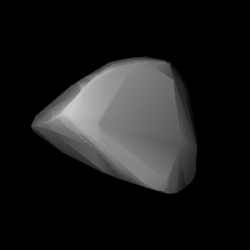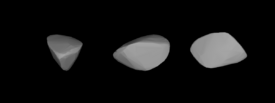Astronomy:19848 Yeungchuchiu
 Yeungchuchiu modeled from its lightcurve | |
| Discovery[1] | |
|---|---|
| Discovered by | W. K. Yeung |
| Discovery site | Desert Beaver Obs. |
| Discovery date | 2 October 2000 |
| Designations | |
| (19848) Yeungchuchiu | |
| Named after | Chu Chiu Yeung (discoverer's father)[2] |
| 2000 TR · 1998 KR38 1999 SY6 | |
| Minor planet category | main-belt · Eos[3] |
| Orbital characteristics[1] | |
| Epoch 4 September 2017 (JD 2458000.5) | |
| Uncertainty parameter 0 | |
| Observation arc | 34.82 yr (12,718 days) |
| |{{{apsis}}}|helion}} | 3.2372 AU |
| |{{{apsis}}}|helion}} | 2.7768 AU |
| 3.0070 AU | |
| Eccentricity | 0.0766 |
| Orbital period | 5.21 yr (1,905 days) |
| Mean anomaly | 94.290° |
| Mean motion | 0° 11m 20.4s / day |
| Inclination | 11.061° |
| Longitude of ascending node | 54.759° |
| 350.16° | |
| Physical characteristics | |
| Mean diameter | 11.69±0.55 km[4] 12.700±0.134[5] 12.90 km (calculated)[3] 13.242±0.282 km[6] |
| Rotation period | 3.450±0.002 h[7] 3.4508±0.0003 h[8] |
| Geometric albedo | 0.14 (assumed)[3] 0.170±0.020[4][5] 0.2107±0.0250[6] |
| S[3] | |
| Absolute magnitude (H) | 12.2[1][3][4] · 11.7[6] · 12.227±0.002 (R)[8] · 12.49±0.28[9] |
19848 Yeungchuchiu (provisional designation 2000 TR) is a stony Eos asteroid from the outer region of the asteroid belt, approximately 12 kilometers (7.5 miles) in diameter. It was discovered on 2 October 2000 by Canadian amateur astronomer William Yeung at the Desert Beaver Observatory in Arizona, United States. It is the largest object found by the discoverer, just 1°.2 west of Jupiter, who named it after his father, Chu Chiu Yeung.[2][10]
Orbit and classification
Yeungchuchiu is a member of the Eos family, an orbital group of more than 4,000 asteroids, which are known for mostly being of stony composition. It orbits the Sun in the outer main-belt at a distance of 2.8–3.2 AU once every 5 years and 3 months (1,905 days). Its orbit has an eccentricity of 0.08 and an inclination of 11° with respect to the ecliptic.[1] The first precovery was taken at the Australian Siding Spring Observatory in 1982, extending the asteroid's observation arc by 18 years prior to its discovery.[10]
Naming
This minor planet was named by the discoverer after his father, Chu Chiu Yeung (born 1925), in gratitude for his unconditional support.[2] The approved naming citation was published by the Minor Planet Center on 9 March 2001 (M.P.C. 42368).[11]
Physical characteristics
Rotation period

In November 2005, a rotational lightcurve of Yeungchuchiu was obtained from photometric observations by the discoverer at the Desert Eagle Observatory in Arizona. Lightcurve analysis gave a well-defined rotation period of 3.450 hours with a brightness variation of 0.70 magnitude ({{{1}}}).[7] The large amplitude suggests that the body is of non-spherical shape and that the long axis is almost twice as long as the short axis. It is likely that the rotational axis was almost perpendicular to the observation's line-of-sight.[7] A second lightcurve was obtained at the Palomar Transient Factory in September 2010, and gave a concurring period of 3.4508±0.0003 hours with an amplitude of 0.63 in magnitude ({{{1}}}).[8]
Diameter and albedo
According to the survey carried out by NASA's Wide-field Infrared Survey Explorer and its subsequent NEOWISE mission, the asteroid measures 11.7 and 13.2 kilometers in diameter with an albedo for its surface of 0.17 and 0.21, respectively.[6][4] The Collaborative Asteroid Lightcurve Link assumes an albedo for stony asteroids of 0.21 and calculates a diameter of 12.9 kilometers with an absolute magnitude of 12.2.[3]
References
- ↑ 1.0 1.1 1.2 1.3 "JPL Small-Body Database Browser: 19848 Yeungchuchiu (2000 TR)". Jet Propulsion Laboratory. https://ssd.jpl.nasa.gov/sbdb.cgi?sstr=2019848.
- ↑ 2.0 2.1 2.2 Schmadel, Lutz D. (2007). "(19848) Yeungchuchiu". Dictionary of Minor Planet Names. Springer Berlin Heidelberg. p. 859. doi:10.1007/978-3-540-29925-7_9589. ISBN 978-3-540-00238-3.
- ↑ 3.0 3.1 3.2 3.3 3.4 3.5 "LCDB Data for (19848) Yeungchuchiu". Asteroid Lightcurve Database (LCDB). http://www.minorplanet.info/PHP/generateOneAsteroidInfo.php?AstInfo=19848%7CYeungchuchiu.
- ↑ 4.0 4.1 4.2 4.3 Masiero, Joseph R.; Mainzer, A. K.; Grav, T.; Bauer, J. M.; Cutri, R. M.; Nugent, C. et al. (November 2012). "Preliminary Analysis of WISE/NEOWISE 3-Band Cryogenic and Post-cryogenic Observations of Main Belt Asteroids". The Astrophysical Journal Letters 759 (1): 5. doi:10.1088/2041-8205/759/1/L8. Bibcode: 2012ApJ...759L...8M. http://adsabs.harvard.edu/cgi-bin/bib_query?bibcode=2012ApJ...759L...8M. Retrieved 17 May 2016.
- ↑ 5.0 5.1 Masiero, Joseph R.; Mainzer, A. K.; Grav, T.; Bauer, J. M.; Cutri, R. M.; Dailey, J. et al. (November 2011). "Main Belt Asteroids with WISE/NEOWISE. I. Preliminary Albedos and Diameters". The Astrophysical Journal 741 (2): 20. doi:10.1088/0004-637X/741/2/68. Bibcode: 2011ApJ...741...68M. http://adsabs.harvard.edu/cgi-bin/bib_query?bibcode=2011ApJ...741...68M. Retrieved 3 December 2016.
- ↑ 6.0 6.1 6.2 6.3 Mainzer, A.; Grav, T.; Masiero, J.; Hand, E.; Bauer, J.; Tholen, D. et al. (November 2011). "NEOWISE Studies of Spectrophotometrically Classified Asteroids: Preliminary Results". The Astrophysical Journal 741 (2): 25. doi:10.1088/0004-637X/741/2/90. Bibcode: 2011ApJ...741...90M. http://adsabs.harvard.edu/cgi-bin/bib_query?bibcode=2011ApJ...741...90M. Retrieved 17 May 2016.
- ↑ 7.0 7.1 7.2 Yeung, Kwong W. (September 2006). "Lightcurve analysis for 19848 Yeungchuchiu". The Minor Planet Bulletin 33 (3): 49. ISSN 1052-8091. Bibcode: 2006MPBu...33...49Y. http://adsabs.harvard.edu/cgi-bin/bib_query?bibcode=2006MPBu...33...49Y. Retrieved 17 May 2016.
- ↑ 8.0 8.1 8.2 Waszczak, Adam; Chang, Chan-Kao; Ofek, Eran O.; Laher, Russ; Masci, Frank; Levitan, David et al. (September 2015). "Asteroid Light Curves from the Palomar Transient Factory Survey: Rotation Periods and Phase Functions from Sparse Photometry". The Astronomical Journal 150 (3): 35. doi:10.1088/0004-6256/150/3/75. Bibcode: 2015AJ....150...75W. http://adsabs.harvard.edu/cgi-bin/bib_query?bibcode=2015AJ....150...75W. Retrieved 17 May 2016.
- ↑ Veres, Peter; Jedicke, Robert; Fitzsimmons, Alan; Denneau, Larry; Granvik, Mikael; Bolin, Bryce et al. (November 2015). "Absolute magnitudes and slope parameters for 250,000 asteroids observed by Pan-STARRS PS1 - Preliminary results". Icarus 261: 34–47. doi:10.1016/j.icarus.2015.08.007. Bibcode: 2015Icar..261...34V. http://adsabs.harvard.edu/cgi-bin/bib_query?bibcode=2015Icar..261...34V. Retrieved 17 May 2016.
- ↑ 10.0 10.1 "19848 Yeungchuchiu (2000 TR)". Minor Planet Center. https://www.minorplanetcenter.net/db_search/show_object?object_id=19848.
- ↑ "MPC/MPO/MPS Archive". Minor Planet Center. https://www.minorplanetcenter.net/iau/ECS/MPCArchive/MPCArchive_TBL.html.
External links
- Lightcurve Database Query (LCDB), at www.minorplanet.info
- Dictionary of Minor Planet Names, Google books
- Asteroids and comets rotation curves, CdR – Geneva Observatory, Raoul Behrend
- Discovery Circumstances: Numbered Minor Planets (15001)-(20000) – Minor Planet Center
- 19848 Yeungchuchiu at AstDyS-2, Asteroids—Dynamic Site
- 19848 Yeungchuchiu at the JPL Small-Body Database
 |

